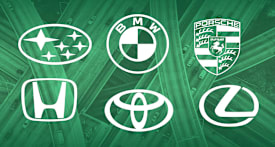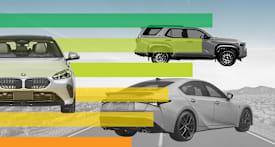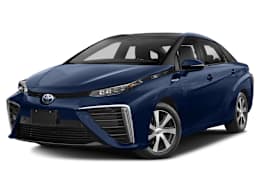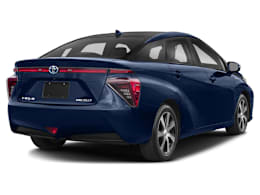Toyota's Mirai is proof that hydrogen fuel-cell vehicles are a viable transportation option -- but it's not yet ready for widespread use. It is the first fuel cell car available to purchase in the U.S., and follows other fuel cell (FC) models that were only available to lease.
The Mirai takes just a few minutes to refill rather than the hours to recharge a conventional EV. And the Mirai's 275-mile range exceeds most EVs by a wide margin. Even better: The only tailpipe emission is water vapor.
But hydrogen stations are so few and far between that the Mirai (or any other FC car) is not viable for most consumers. It might work for those who live near a hydrogen station. Even getting beyond the hydrogen hurdle, we found the Mirai very compromised in terms of the way it drives and in its interior accommodations.
The Mirai's primary advantage is that it's an all-electric car that doesn't suffer from typical electric-vehicle limitations, namely short range and long charging times. It uses hydrogen as fuel, which is converted into electricity to power the car.
Be aware that although the Mirai is a four-door sedan it's only a four-seater. Rear passengers must contend with limited legroom, short seats, and jammed-up toes. The Honda Clarity, another fuel cell car currently available for lease, has five seats. Rear seat legroom in the Mirai is also limited by the high floor. At least it's easy to get in and out, thanks to its tall stance.
This heavy, 4,100-pound car feels sluggish and clumsy when underway. Acceleration during everyday driving is lethargic even though we clocked its 0-60 mph acceleration run in 9.3 seconds. Handling is awkward with pronounced body roll, a sensation that is amplified by the Mirai's tall stance. The brake pedal feels mushy.
On the other hand, ride comfort is quite plush, on par with some luxury cars. Outside noise is kept to a minimum, with the cabin quiet except for some odd whooshing and whirring sounds. Equipment levels and interior quality are lavish, befitting its high price. Despite the unconventional layout, most controls work intuitively. And forward-collision warning and automatic emergency braking come standard.
The Mirai is priced at $57,500. Potential customers are likely to opt for a three-year lease which is currently $349 a month with a $2,500 initial payment. Toyota will cover fuel costs for three years or up to $15,000, whichever comes first. The government estimates annual fuel cost at $1,250 for 15,000 miles, about twice the gas cost for a Toyota Prius.
The Mirai may be a novelty and might work as a local runabout for a handful of people, but ultimately neither the car nor the hydrogen infrastructure are ready for mass market appeal.


























